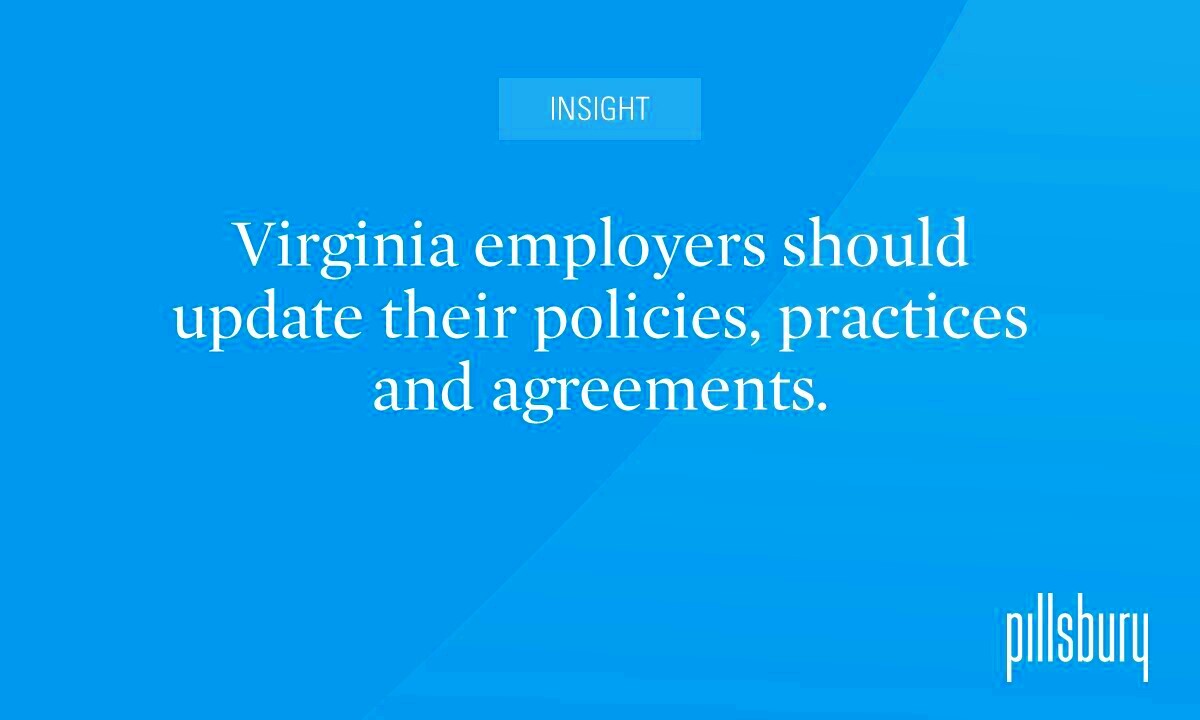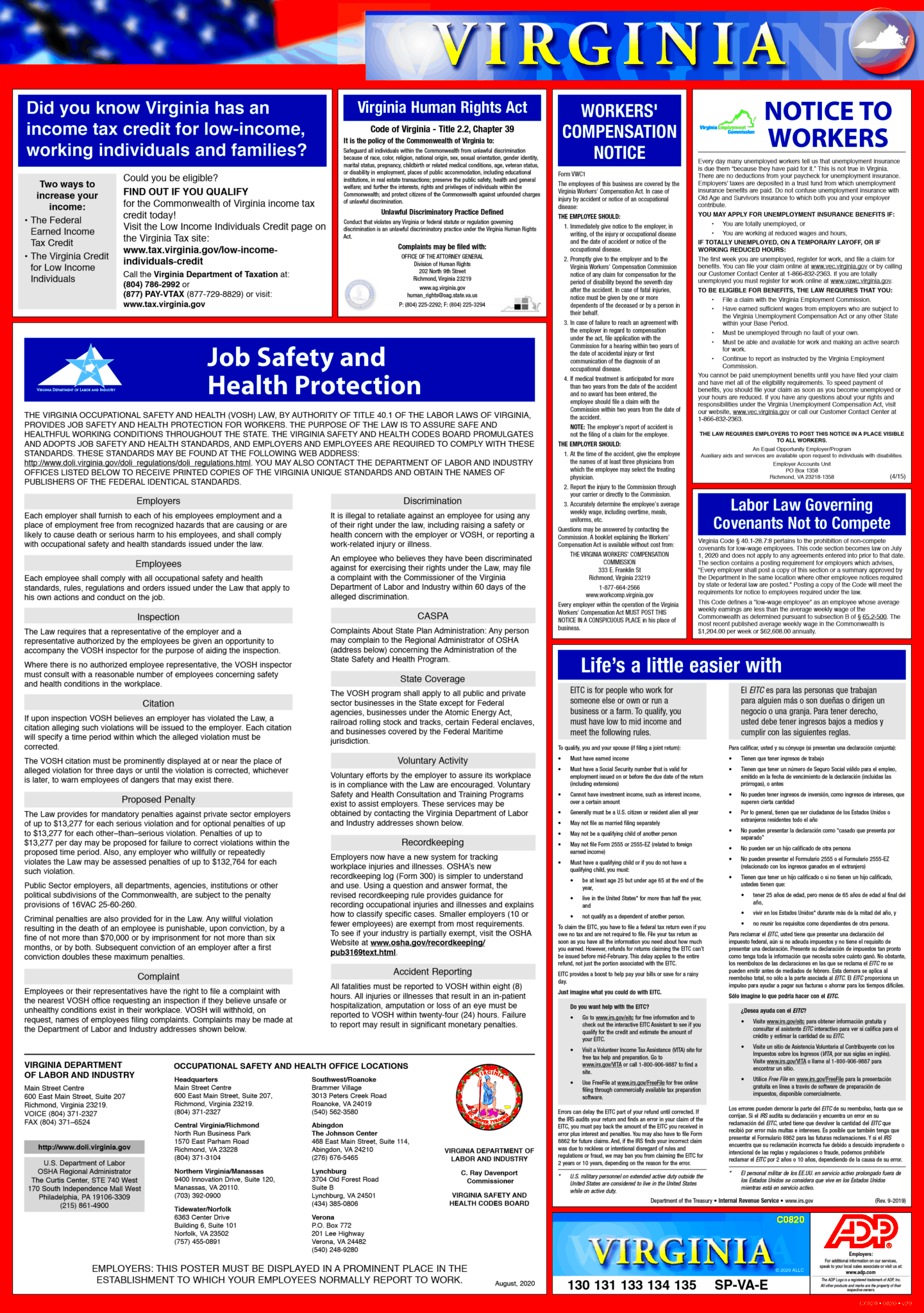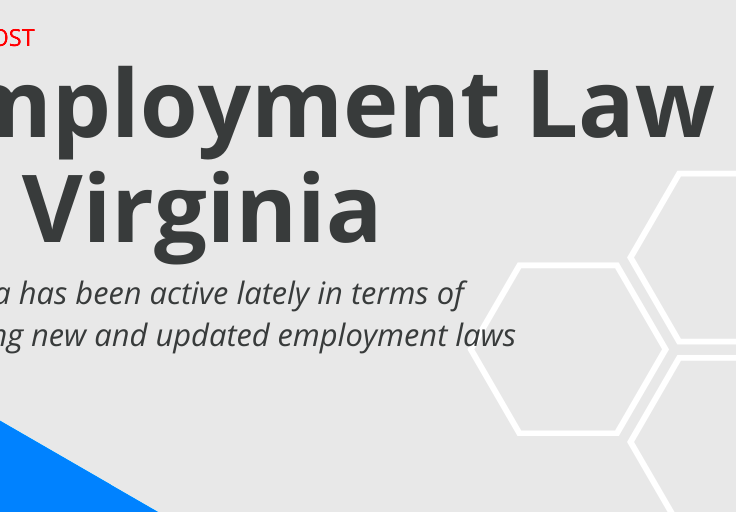Virginia Employment Regulations Explained
Virginia employment regulations play a vital role in shaping the workplace environment. These laws protect both employees and employers, ensuring fair treatment and a safe work atmosphere. Understanding these regulations helps workers know their rights and responsibilities, while employers can avoid legal pitfalls. Let’s dive into some key aspects of these regulations that govern employment in Virginia.
Key Employment Laws in Virginia

Virginia has several important employment laws that affect both employees and employers. Here are some of the key laws:
- Virginia Employment Discrimination Act (VEDA): This law prohibits discrimination based on race, color, religion, sex, national origin, age, disability, and pregnancy.
- Virginia Wage Payment Act: This law requires employers to pay employees on time and outlines the process for wage disputes.
- Virginia Workers’ Compensation Act: This act provides benefits to workers who are injured on the job, ensuring they receive necessary medical care and compensation for lost wages.
- Family and Medical Leave Act (FMLA): Virginia adheres to FMLA, which allows eligible employees to take unpaid leave for family or medical reasons without fear of losing their jobs.
These laws create a framework for fair treatment in the workplace, helping maintain a balance between employee rights and employer responsibilities.
Wages and Overtime Requirements

Understanding wages and overtime requirements is crucial for both employees and employers in Virginia. Here are the key points:
- Minimum Wage: As of 2024, the minimum wage in Virginia is $15 per hour, which is set to increase to $15.50 in 2025.
- Overtime Pay: Employees who work more than 40 hours in a week are entitled to overtime pay at a rate of 1.5 times their regular hourly wage.
- Exemptions: Some employees, like certain salaried workers and professionals, may be exempt from overtime pay. It’s important to determine if an employee qualifies as exempt based on specific criteria.
- Wage Payment: Employers must pay employees their wages on a regular schedule, typically bi-weekly or monthly. If there are disputes regarding unpaid wages, employees can file a claim with the Virginia Department of Labor and Industry.
Being aware of these wage and overtime laws helps protect workers’ rights and ensures fair compensation for their hard work.
Workplace Safety Regulations
Ensuring workplace safety is essential for creating a healthy and productive environment. In Virginia, various regulations aim to protect employees from hazards and promote their well-being. Understanding these safety regulations helps both employers and employees maintain a safe workplace.
Here are some key aspects of workplace safety regulations in Virginia:
- Occupational Safety and Health Administration (OSHA): Virginia follows OSHA standards, which set guidelines for workplace safety. These regulations cover a wide range of topics, including hazardous materials, machinery safety, and general workplace practices.
- Safety Training: Employers must provide safety training to employees to ensure they understand potential hazards and know how to work safely. This includes training on equipment usage, emergency procedures, and proper handling of materials.
- Reporting Injuries: Employees should report any workplace injuries or unsafe conditions immediately. Employers are required to keep records of these incidents and take appropriate measures to prevent future occurrences.
- Personal Protective Equipment (PPE): Employers must provide necessary PPE, such as helmets, gloves, and safety goggles, to protect employees from workplace hazards.
By following these safety regulations, both employers and employees can work together to create a safer work environment.
Employee Rights and Protections
Employees in Virginia enjoy various rights and protections that ensure fair treatment and respect in the workplace. Knowing these rights can empower employees to stand up for themselves and promote a positive work culture.
Here are some important employee rights in Virginia:
- Right to Fair Pay: Employees have the right to receive fair wages for their work, including overtime pay when applicable.
- Right to a Safe Workplace: Employees are entitled to work in an environment free from hazards and unsafe conditions.
- Right to Organize: Employees can join unions and engage in collective bargaining without fear of retaliation from employers.
- Protection from Retaliation: Employees who report violations or participate in investigations are protected from retaliation, ensuring they can speak up without fear.
- Access to Benefits: Employees have the right to access benefits like family and medical leave, health insurance, and retirement plans as outlined by their employers.
Understanding these rights helps employees feel secure and confident in their workplaces.
Discrimination and Harassment Policies
Discrimination and harassment in the workplace can create a toxic environment that affects employee morale and productivity. Virginia has laws in place to address these issues and protect employees from unfair treatment.
Key components of discrimination and harassment policies include:
- Zero Tolerance Policy: Employers should establish a clear zero-tolerance policy against discrimination and harassment. This policy should be communicated to all employees and include definitions of what constitutes inappropriate behavior.
- Reporting Mechanisms: Employees must have a safe and confidential way to report incidents of discrimination or harassment. Employers should provide multiple channels for reporting, such as HR representatives or anonymous hotlines.
- Investigation Procedures: Upon receiving a report, employers should promptly investigate the allegations. This includes interviewing the involved parties and gathering evidence to determine the appropriate course of action.
- Training Programs: Regular training on discrimination and harassment should be provided to all employees. This helps create awareness, educates staff on acceptable behavior, and fosters a respectful workplace culture.
- Consequences for Violations: Employers must outline clear consequences for those found guilty of discrimination or harassment. This may include disciplinary actions, up to and including termination.
By implementing strong discrimination and harassment policies, employers can create a safer, more inclusive workplace for everyone.
Family and Medical Leave in Virginia
Family and medical leave is essential for employees needing time off to care for themselves or their loved ones. In Virginia, this right is protected under both state and federal laws, ensuring that employees can take the necessary time without risking their jobs. Understanding these provisions can help employees make informed decisions about their leave options.
Here are key points regarding family and medical leave in Virginia:
- Family and Medical Leave Act (FMLA): Eligible employees can take up to 12 weeks of unpaid leave within a 12-month period for specific family and medical reasons. These reasons may include:
- Birth and care of a newborn child
- Adoption or foster care placement
- Serious health condition affecting the employee
- Care for an immediate family member with a serious health condition
- Eligibility: To qualify for FMLA, employees must have worked for at least 12 months and logged at least 1,250 hours during the previous year. Additionally, the employer must have 50 or more employees within a 75-mile radius.
- Job Protection: Employees taking FMLA leave are entitled to return to their same or equivalent position after their leave ends, ensuring job security.
- Health Benefits: During FMLA leave, employees can maintain their health insurance coverage under the same terms as if they were actively working.
By understanding family and medical leave, employees can effectively plan for their needs while ensuring their rights are protected.
Termination and Layoff Procedures
Termination and layoff procedures can be sensitive topics for both employees and employers. Virginia follows certain guidelines to ensure that these processes are fair and legal. Knowing these procedures can help employees navigate their rights during challenging times.
Here are essential aspects of termination and layoff procedures in Virginia:
- At-Will Employment: Virginia is an at-will employment state, meaning employers can terminate employees for any reason, as long as it’s not illegal (e.g., discrimination or retaliation).
- Notice Requirements: While employers are not legally required to provide notice before termination, it’s good practice to do so, especially during layoffs. Advance notice helps employees prepare for the transition.
- Final Paychecks: Employees who are terminated or laid off must receive their final paycheck on the next regular payday. This paycheck should include any unpaid wages, accrued vacation, or PTO as per company policy.
- Severance Pay: Severance pay is not mandatory in Virginia, but employers may offer it as part of a termination package. This can help employees during their job search.
- Unemployment Benefits: Laid-off employees may be eligible for unemployment benefits. They should apply as soon as possible after termination to receive assistance.
By understanding these termination and layoff procedures, employees can protect their rights and make informed decisions during challenging circumstances.
Frequently Asked Questions
When it comes to employment regulations in Virginia, questions often arise. Here are some frequently asked questions to help clarify common concerns:
- What should I do if I believe my rights are violated? If you believe your rights have been violated, document the incident and report it to your HR department or a supervisor. You may also consider filing a complaint with the Virginia Department of Labor and Industry.
- Can I be fired for taking family and medical leave? No, it’s illegal to fire or retaliate against an employee for taking FMLA leave. If you experience this, consider seeking legal advice.
- How can I file a complaint about workplace safety? If you notice unsafe working conditions, report them to your supervisor or the OSHA office. They will investigate your complaint to ensure compliance with safety regulations.
- Are employees entitled to breaks during the workday? Virginia law does not require breaks, but employers are encouraged to provide reasonable breaks to maintain employee well-being.
- What should I include in my resignation letter? Your resignation letter should include your intention to resign, your last working day, and a brief expression of gratitude towards the employer. Keeping it professional is essential.
These FAQs provide clarity on common concerns, helping employees navigate the complexities of Virginia employment regulations.
Conclusion
Understanding Virginia’s employment regulations is essential for both employees and employers. These laws are designed to create a fair, safe, and equitable workplace. From family and medical leave rights to termination and layoff procedures, knowing your rights can empower you in your professional life. Employers who adhere to these regulations not only foster a positive work environment but also protect themselves from legal issues. By staying informed and proactive, both employees and employers can contribute to a healthier workplace culture where everyone thrives.


